HVAC Companies Stevenston
Find top HVAC Companies in Stevenston
Get multiple HVAC Companies quotes for your project today! Compare profiles, reviews, accreditations, portfolio, etc... and choose the best service.

Just Heat Sure
Office 3, 6 Ben vorlich drive, Glasgow, G53 7PF, GBAt JustHeatSure, we are more than just heating specialists – we are your dedicated partners in bringing innovative and eco-friendly solutions to your doorstep in Glasgow. With a commitment to excellence and sustainability, we specialize in Solar Power Panel Installation, Boiler Installation, and Air Source Heat Pump Installation. Our mission is clear – to transform Glasgow’s heating landscape with innovative, sustainable, and cost-effective solutions. We believe in utilizing the latest technologies to create efficient and environmentally friendly heating systems.
- Services
- Why Us?
- Gallery
Get Quote
co-at marine limited
123 Renfrew Road, Mirren Court Three, Paisley, PA3 4EA, GBCO-AT Marine Limited is a leading provider of marine and offshore HVAC & Refrigeration solutions. Since our establishment in 2005, we have grown from strength to strength, building a reputation for excellence and reliability. With a foundation rooted in experience and expertise, we continue to excel in our market and provide our valued customers with an unrivalled customer-centred service. We aim to use our extensive knowledge of marine heating, ventilation, air conditioning and refrigeration to provide the most cost-effective and reliable means of creating a safe and comfortable environment on board ships and offshore structures. Our comprehensive service encompasses the entire lifecycle of marine HVAC & refrigeration systems, starting with an initial survey and progressing through conceptual and detailed design phases. We also handle the procurement of equipment and provide project management services. At CO-AT, we understand that the maritime industry demands efficiency, reliability, and innovation. That’s why we have assembled a team of highly skilled professionals who possess deep expertise and a genuine passion for what they do. Our team is dedicated to providing tailored services that help our clients navigate the challenges of the ever-evolving marine landscape. Our customer-centred philosophy is at the heart of our mission. We prioritize your unique needs, ensuring every solution is tailored to enhance your maritime operations and exceed expectations. Our team of seasoned engineers brings a wealth of expertise to the table. From navigating regulatory requirements to implementing cutting-edge technologies, we deliver solutions that stand the test of time. Whether you’re seeking high-quality equipment, project management expertise, or consultancy services, we are your one-stop solution. Our comprehensive services are designed to meet the specific requirements of our customers, ensuring a seamless and efficient process from start to finish. We provide our services to prestigious clients across the world.
- Services
- Why Us?
- Accreditations
- Our Team
- Testimonials
- Gallery
Get Quote
Aqua Cooling Ltd
Chandler’s Ford Industrial Estate, Unit 6 Brickfield Lane, Eastleigh, SO53 4DP, GBHello, we're Aqua, The Temperature Control People. Let's talk. With over 20 years experience supporting customers big and small, from north to south, you can rely on us 24/7 for your sales, hire and service needs. Our team is always here to help, and ready to help you make things happen. Our process cooling specialists are on hand to support you from initial product selection through to delivery, installation & commissioning. Whether you’re looking for a single, supply only unit or a completely bespoke system, we’re here to help. We have a comprehensive fleet of temperature control equipment, available for immediate hire across the UK. From process chillers and air conditioning systems to boilers and heating equipment, our technically led hire experts will keep your business operational 24/7. Aqua’s Service team offers 24/7 after sales support, 365 days of the year. Our Engineers are specialist trained experts, based across the UK, meaning we’re never far away when you need us. Aqua are F-Gas and Safe Contractor accredited. From our head office team to our field-based engineers, every member of our team is passionate about delivering the best temperature control solution for our customers. Our team all have industry leading training and experience that equips them with the knowledge and expertise to make sure that temperature control challenges of any type can be overcome, adding value to business and making life easy for customers. Our team also care. There’s a lot to love about the impact temperature control has on industry, business, society and our planet and everyone at Aqua is proud to be a temperature control person making a difference to the world we live in.
- Services
- Why Us?
- Accreditations
- Gallery
Get Quote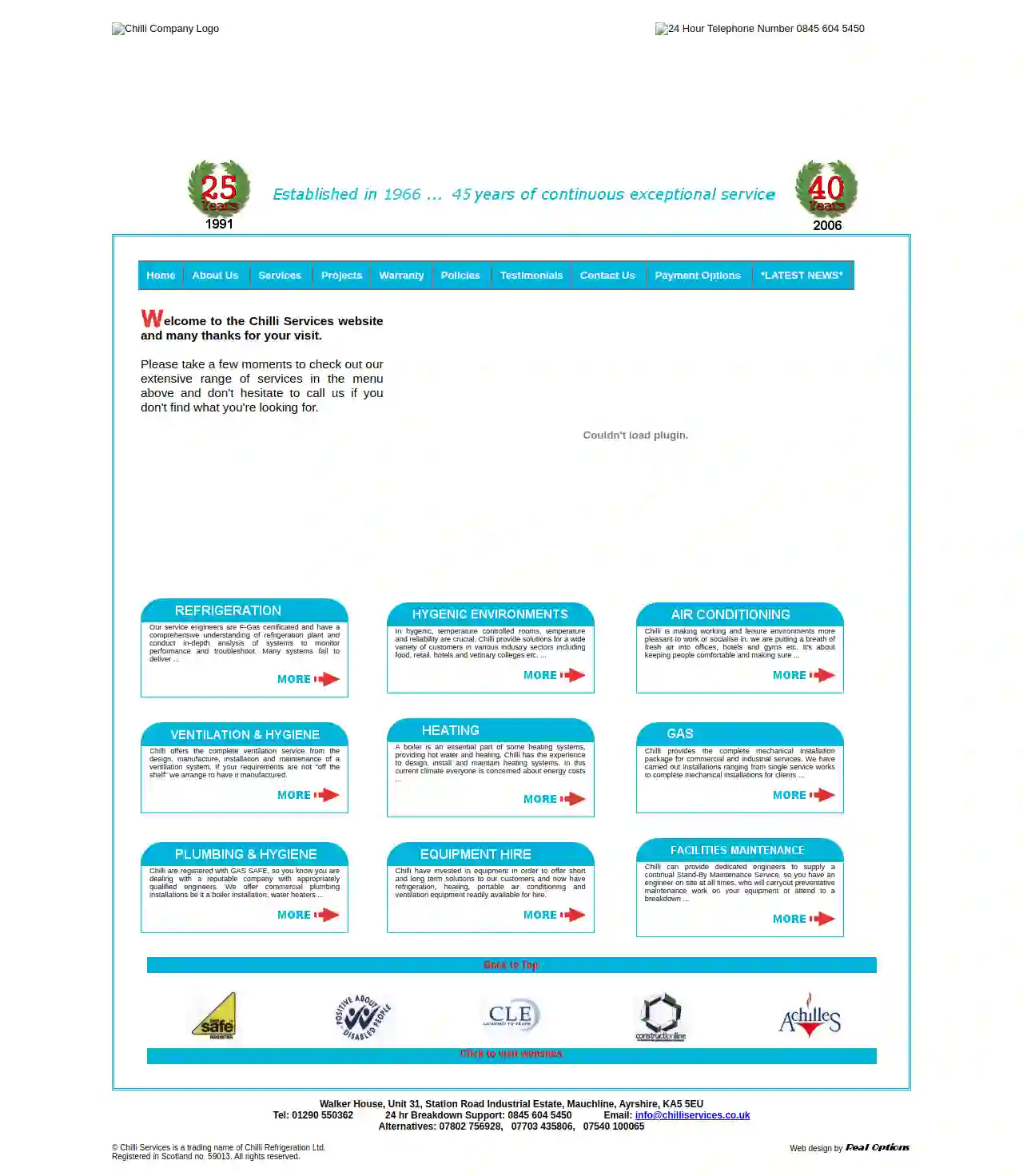
Chilli Services
3.73 reviewsMauchline, Station Road Industrial Estate, KA5 5EU, GBWelcome to Chilli Services, a leading provider of refrigeration, air conditioning, ventilation, and plumbing services. With over 50 years of experience, we have built a reputation for delivering excellent customer service and minimizing production downtime. Our team of expert engineers is F-Gas certified and has a comprehensive understanding of refrigeration plant and conduct in-depth analysis of systems to monitor performance and troubleshoot. We provide solutions for a wide variety of customers in various industry sectors, including food, retail, hotels, and veterinary colleges. Our services include design, manufacture, installation, and maintenance of ventilation systems, as well as commercial plumbing installations. We are registered with GAS SAFE and offer a 24-hour breakdown support service. Our team is dedicated to providing a high level of service and ensuring that our customers are satisfied with our work.
- Services
- Why Us?
- Accreditations
- Our Team
- Testimonials
- Gallery
Get Quote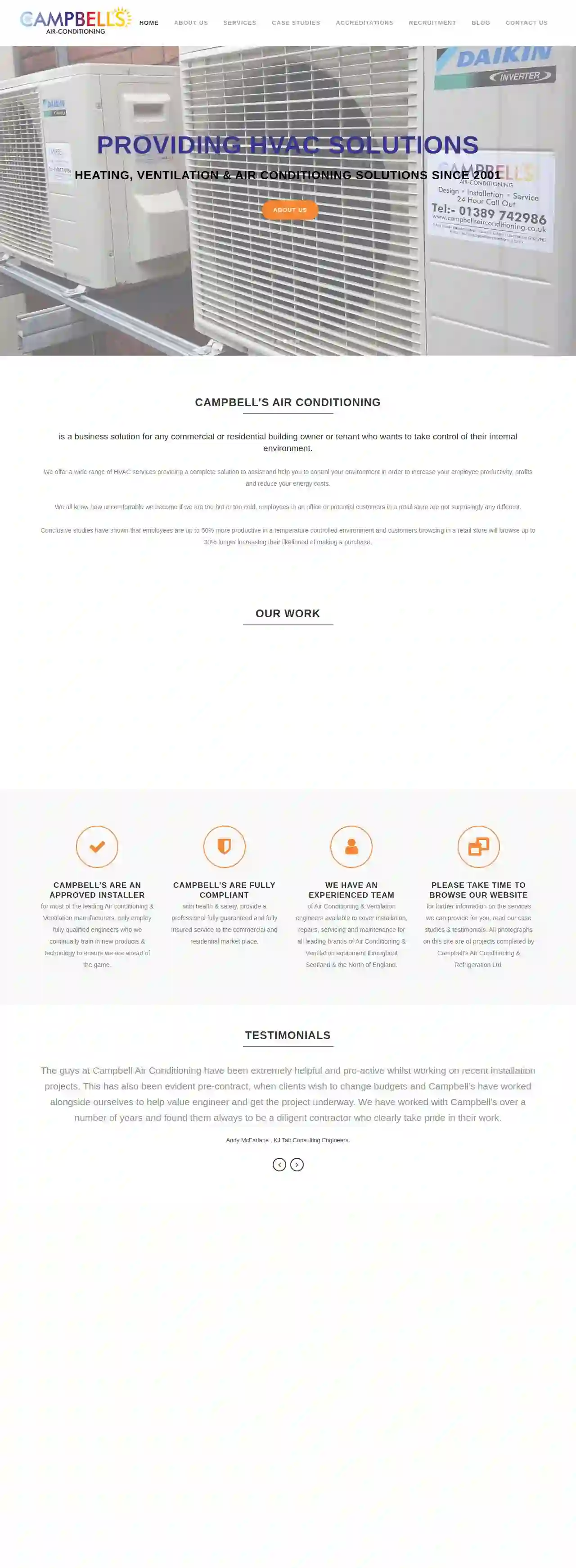
Campbells Air Conditioning & Refrigeration Ltd
51 reviews168 WEST GEORGE STREET, GBCAMPBELL’S AIR CONDITIONING is a business solution for any commercial or residential building owner or tenant who wants to take control of their internal environment. We offer a wide range of HVAC services providing a complete solution to assist and help you to control your environment in order to increase your employee productivity, profits and reduce your energy costs. We all know how uncomfortable we become if we are too hot or too cold, employees in an office or potential customers in a retail store are not surprisingly any different. Conclusive studies have shown that employees are up to 50% more productive in a temperature controlled environment and customers browsing in a retail store will browse up to 30% longer increasing their likelihood of making a purchase. OUR WORK CAMPBELL’S ARE AN APPROVED INSTALLER for most of the leading Air conditioning & Ventilation manufacturers, only employ fully qualified engineers who we continually train in new products & technology to ensure we are ahead of the game. CAMPBELL’S ARE FULLY COMPLIANT with health & safety, provide a professional fully guaranteed and fully insured service to the commercial and residential market place. WE HAVE AN EXPERIENCED TEAM of Air Conditioning & Ventilation engineers available to cover installation, repairs, servicing and maintenance for all leading brands of Air Conditioning & Ventilation equipment throughout Scotland & the North of England. PLEASE TAKE TIME TO BROWSE OUR WEBSITE for further information on the services we can provide for you, read our case studies & testimonials. All photographs on this site are of projects completed by Campbell’s Air Conditioning & Refrigeration Ltd.
- Services
- Why Us?
- Testimonials
- Gallery
Get Quote
Protech Heating Limited
54 reviewsGlasgow, GBWe’re an industry leading provider of bespoke energy solutions and water management services. Founded in 2008 in Glasgow, Scotland with nationwide coverage, our dedicated team of energy specialists have the experience and knowledge to deliver tailored solutions to meet businesses specific requirements. Your journey to Net ZeroOur mission is to empower businesses to take tangible steps towards a more environmentally friendly future.Learn more Our energy solutionsOur extensive range of renewable and low carbon solutions are tailored to suit individual business requirements.Learn more Maintenance ServicesWe offer a range of maintenance service packages to ensure your energy equipment runs smoothly. Learn more At Protech, we’re proud of our award-winning status as energy specialists. Our wealth of experience in specifying, installing and maintaining an extensive range of renewables for diverse businesses, from single-site SMEs to complex industrial and critical plant works, makes us the perfect partner for business energy transition. Tony Reilly, Director of Protech Group Flogas & Protech GroupIn 2022 Protech Group embarked on an exciting journey by joining forces with Flogas Britain. This aquisition means we’re able to offer businesses traditional low carbon fuels, such as LPG, as well as an even wider range of cutting-edge renewable energy solutions and net zero support. The FutureTogether, we’re comitted to making a significant impact on the journey to net zero for our customers.Speak to us today to see how we can support your business
- Services
- Why Us?
- Gallery
Get Quote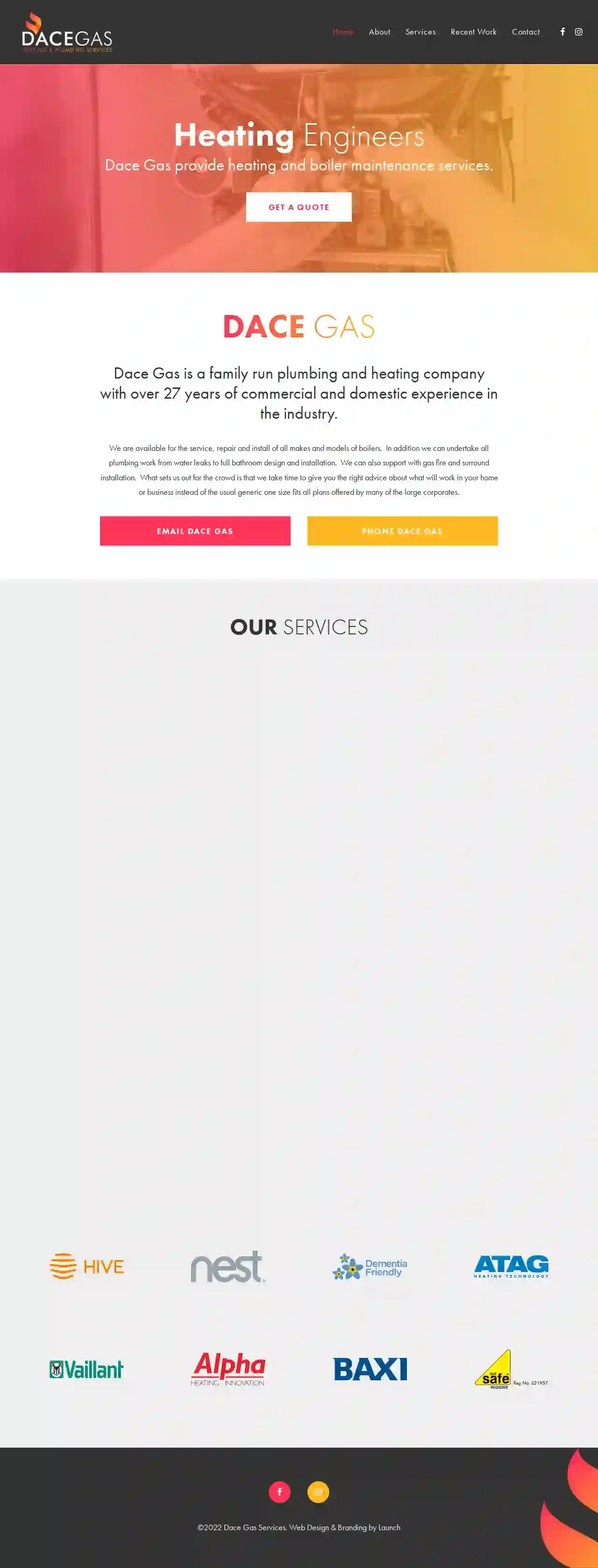
Dace Gas Services
514 reviewsAyr, GBDace Gas is a family run plumbing and heating company with over 27 years of commercial and domestic experience in the industry. We are available for the service, repair and install of all makes and models of boilers. In addition we can undertake all plumbing work from water leaks to full bathroom design and installation. We can also support with gas fire and surround installation. What sets us out for the crowd is that we take time to give you the right advice about what will work in your home or business instead of the usual generic one size fits all plans offered by many of the large corporates.
- Services
- Why Us?
- Gallery
Get Quote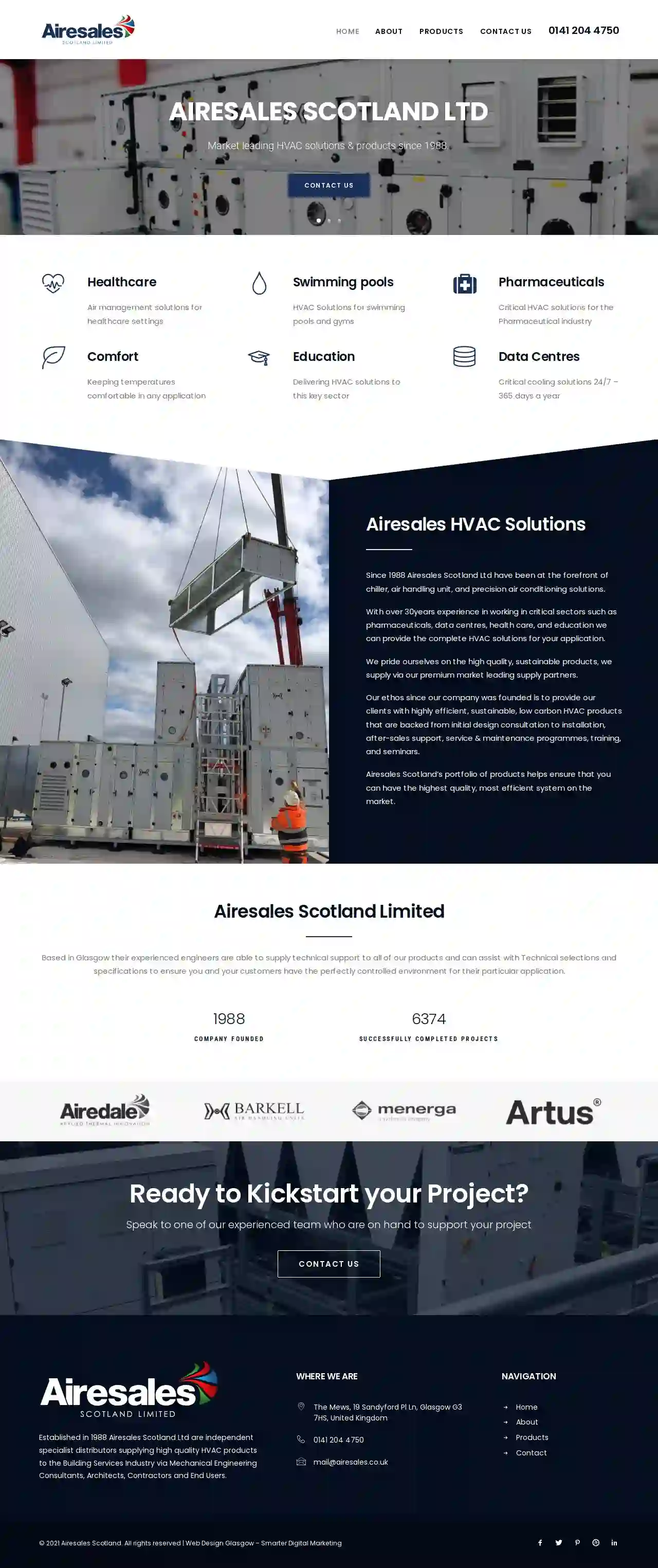
Airesales (Scotland)
The Mews, 19 Sandyford Pl Ln, Glasgow, G3 7HS, GBAiresales Scotland Ltd is a market leading HVAC solutions and products provider since 1988. With over 30 years of experience in working in critical sectors such as pharmaceuticals, data centres, healthcare, and education, we can provide complete HVAC solutions for your application. We pride ourselves on high-quality, sustainable products supplied via our premium market-leading supply partners. Our ethos is to provide clients with highly efficient, sustainable, low-carbon HVAC products backed from initial design consultation to installation, after-sales support, service & maintenance programmes, training, and seminars. Our portfolio of products ensures you can have the highest quality, most efficient system on the market. Established in 1988, Airesales Scotland Ltd is an independent specialist distributor supplying high-quality HVAC products to the Building Services Industry via Mechanical Engineering Consultants, Architects, Contractors, and End Users.
- Services
- Why Us?
- Gallery
Get Quote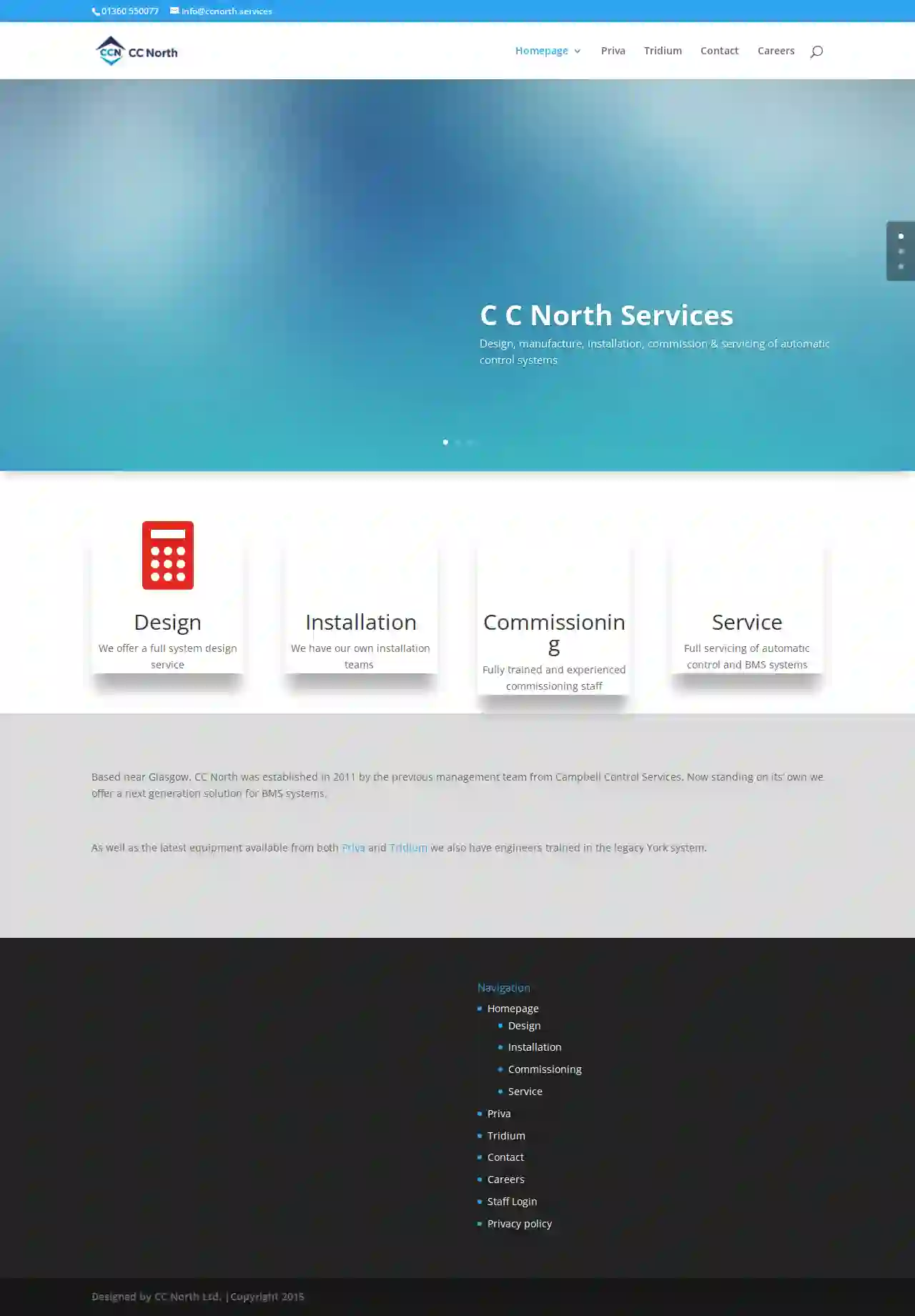
CC North Ltd
4.84 reviewsGlasgow, GBC C North Services is a company that designs, manufactures, installs, commissions, and services automatic control systems. Based near Glasgow, the company was established in 2011 by the previous management team from Campbell Control Services. With a next-generation solution for BMS systems, CC North offers the latest equipment from Priva and Tridium, as well as engineers trained in the legacy York system.
- Services
- Why Us?
- Gallery
Get Quote
Chalmers Gas & Heating LTD
4.942 reviews29 Gartloch Way, Glasgow, G69 8FD, GBWelcome to Chalmers Plumbing & Heating. We offer a range of gas, heating and plumbing services throughout Glasgow and the surrounding areas. We have 15+ years of experience in delivering friendly and professional gas, heating and plumbing services. Our engineers are Gas Safe registered and accredited with leading boiler brands. No job too big or too small, so please get in touch today.
- Services
- Why Us?
- Accreditations
- Our Team
- Testimonials
- Gallery
Get Quote
Over 12,692+ HVAC Contractors on our platform
Our HVAC contractors operate in Stevenston and beyond!
HVACCompaniesHub has curated and vetted the Best HVAC Contractors in Stevenston. Find a top & reliable contractor today.
Frequently Asked Questions About HVAC Companies
- Experience: Choose a contractor with extensive experience in the HVAC industry, especially in the type of service you need.
- Licensing and Insurance: Verify that the contractor is properly licensed and insured.
- Certifications: Look for NATE (North American Technician Excellence) certification, which indicates a high level of technical competency.
- Reputation: Check online reviews and ratings to assess the contractor's reputation and customer satisfaction levels.
- References: Ask for references from past customers and contact them to inquire about their experience.
- Estimates and Quotes: Get written estimates or quotes from multiple contractors to compare pricing and services.
- Warranty Information: Ask about warranties on equipment and labor.
- Communication: Effective communication is key. Choose a contractor who responds promptly and clearly answers your questions.
- Split Systems: The most common type, consisting of an outdoor unit (condenser/compressor) and an indoor unit (air handler/furnace).
- Heat Pumps: Provide both heating and cooling by transferring heat between indoor and outdoor air.
- Ductless Mini-Splits: Ideal for homes without existing ductwork or for adding heating and cooling to specific zones.
- Packaged Units: A single unit that contains all the system's components.
- Geothermal Heat Pumps: Use the earth's stable temperature to provide highly efficient heating and cooling.
- Change Air Filters: Change or clean your air filters every 1-3 months. Dirty air filters restrict airflow and decrease system efficiency.
- Clear Debris: Ensure there are no obstructions near the vents inside your home.
- Check Thermostat Settings: Make sure your thermostat is set to the desired temperature and is functioning correctly.
What is an AFUE rating, and why is it important?
How do I choose the right HVAC contractor?
What are the different types of HVAC systems?
What regular maintenance should I do on my HVAC system?
What is an AFUE rating, and why is it important?
How do I choose the right HVAC contractor?
- Experience: Choose a contractor with extensive experience in the HVAC industry, especially in the type of service you need.
- Licensing and Insurance: Verify that the contractor is properly licensed and insured.
- Certifications: Look for NATE (North American Technician Excellence) certification, which indicates a high level of technical competency.
- Reputation: Check online reviews and ratings to assess the contractor's reputation and customer satisfaction levels.
- References: Ask for references from past customers and contact them to inquire about their experience.
- Estimates and Quotes: Get written estimates or quotes from multiple contractors to compare pricing and services.
- Warranty Information: Ask about warranties on equipment and labor.
- Communication: Effective communication is key. Choose a contractor who responds promptly and clearly answers your questions.
What are the different types of HVAC systems?
- Split Systems: The most common type, consisting of an outdoor unit (condenser/compressor) and an indoor unit (air handler/furnace).
- Heat Pumps: Provide both heating and cooling by transferring heat between indoor and outdoor air.
- Ductless Mini-Splits: Ideal for homes without existing ductwork or for adding heating and cooling to specific zones.
- Packaged Units: A single unit that contains all the system's components.
- Geothermal Heat Pumps: Use the earth's stable temperature to provide highly efficient heating and cooling.
What regular maintenance should I do on my HVAC system?
- Change Air Filters: Change or clean your air filters every 1-3 months. Dirty air filters restrict airflow and decrease system efficiency.
- Clear Debris: Keep the area around your outdoor unit clear of debris, leaves, and snow.
- Check Thermostat Settings: Make sure your thermostat is set to the desired temperature and is functioning correctly.